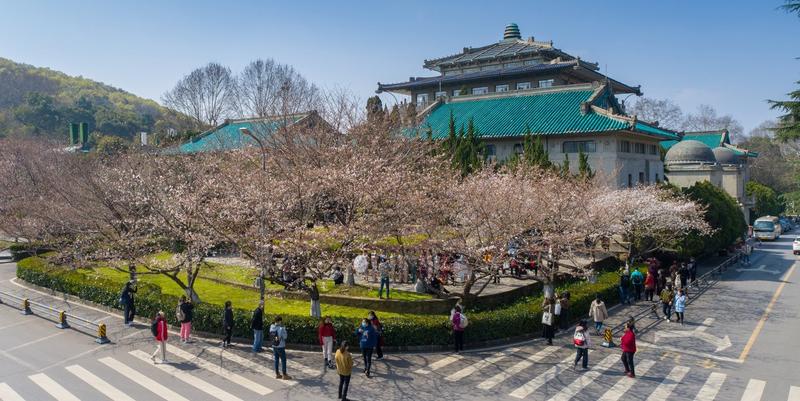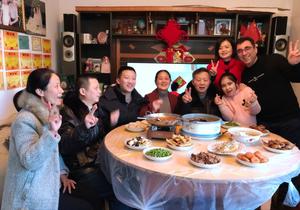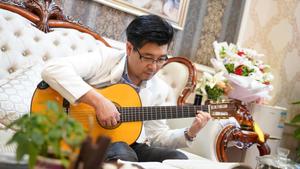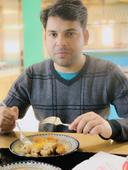 In this undated file photo, students and staff members admire the cherry blossom at Wuhan University, Hubei province. (PHOTO BY KE HAO / FOR CHINA DAILY)
In this undated file photo, students and staff members admire the cherry blossom at Wuhan University, Hubei province. (PHOTO BY KE HAO / FOR CHINA DAILY)
After living in China for 17 years, Ghamgeen Izat Rashed was happy to have his China "green card "approved earlier this year, which entitles him to permanent residency.
The Iraqi university teacher in Wuhan, capital of Hubei province, said he aims to use the knowledge and experience gained from his work to increase international cooperation.
Rashed, who obtained a doctoral degree in electrical engineering from Huazhong University of Science and Technology in Wuhan in 2008, is also looking forward to living a secure and happy life in the city he now calls home.
Since 2010, he has been an associate professor at Wuhan University's School of Electrical Engineering and Automation. He is married to a local woman and has an 8-year-old daughter.
Looking back to last year, when Wuhan experienced a 76-day lockdown before life began to return to normal, and also to the start of this year when sporadic cases of COVID-19 were reported in China before Spring Festival, Rashed said his work had not been affected.
I want to thank China for its effective pandemic control and prevention measures. After an initial short period of confusion, people's requests have been met and everything is in order.
Ghamgeen Izat Rashed, Iraqi university teacher in Wuhan
Instead, he made significant progress, which gave him confidence about the future.
His team launched two international cooperation programs-one to build an artificial intelligence laboratory with a college in Iraq, and the other to promote academic collaboration on solar and wind power with experts in Egypt.
Rashed and his partner in Germany had a paper published in the Science Citation Index, an electronic database for articles from scientific journals.
During the lockdown in Wuhan, Rashed taught online. He said the community where he lives arranged everything, such as helping residents buy food and drugs, and assisting elderly and pregnant patients receive prompt treatment.
After the university resumed classes in June, students were not allowed to leave the campus, except for special occasions. They and their teachers had to scan a health code to enter classrooms and they were also required to log their temperature with an online platform every day.
"I want to thank China for its effective pandemic control and prevention measures. After an initial short period of confusion, people's requests have been met and everything is in order," Rashed said.
 In this undated file photo, Ghamgeen Izat Rashed (right), an Iraqi university teacher in Wuhan, poses with his wife's family at a Spring Festival family gathering in the city. (PHOTO PROVIDED TO CHINA DAILY)
In this undated file photo, Ghamgeen Izat Rashed (right), an Iraqi university teacher in Wuhan, poses with his wife's family at a Spring Festival family gathering in the city. (PHOTO PROVIDED TO CHINA DAILY)
He added that his family members in China were able to enjoy Spring Festival, which was celebrated on Lunar New Year's Eve with dinner for eight shared with his parents-in-law and the family of his wife's brother.
"My mother-in-law sent a double 'red packet' to my daughter, saying it was to make up for last year when the family missed the reunion dinner. I also sent red packets to my parents-in-law and children. My father-in-law asked me about my job and we let off fireworks," Rashed said.
He added that he is interested in Chinese tradition, and what he likes most about it is that elderly people are highly respected in a family.
ALSO READ: Wuhan prepares for happier Spring Festival
During the Spring Festival holiday, Rashed, his wife and daughter visited outdoor scenic spots every day, such as the Wuhan Botanical Garden. They also enjoyed a leisurely stay at a suburban resort hotel.
"Everywhere was crowded and everybody seemed happy," he said.
This year, he hopes to contribute more to international cooperation for the university, and that his daughter can make further progress with her studies.
He also plans to buy a Chinese-made new energy sport utility vehicle, as he feels that such autos make good use of technology and are not expensive.
"China supports development of the new energy industry, and I think there will be more charging points for these vehicles," he said.
"I've also seen that Wuhan's GDP ranked in the top 10 among provincial capitals last year. In view of the impact of the pandemic, this is remarkable. I believe the local economy can continue to prosper and that Wuhan can become a first-tier city."
Rashed said obtaining a "green card" had long been an ambition for him and his family, and the good news has enabled him to form deeper links with the city.
 In this undated file photo, Lee Sang-ki, a plastic surgeon from South Korea, has remained in Wuhan during the pandemic. (PHOTO PROVIDED TO CHINA DAILY)
In this undated file photo, Lee Sang-ki, a plastic surgeon from South Korea, has remained in Wuhan during the pandemic. (PHOTO PROVIDED TO CHINA DAILY)
Taste of home
On Lunar New Year's Eve in Wuhan, Lee Sang-ki, a plastic surgeon from South Korea, decided to cook fried chicken, as his favorite restaurant serving this dish was closed for the holiday. The crispy and appetizing delicacy, along with a can of beer, made his night.
Not as experienced with a spatula as with a scalpel, he overcooked some of the chicken, but despite this, he was happy to spend the night alone, because the food gave him a taste of home.
At the height of the pandemic in the city, Lee Sang-ki, a plastic surgeon from South Korea, had three opportunities to return to South Korea on charter flights, but he chose to stay after learning that more than 100 of his compatriots in Wuhan had also decided against going home
During the lockdown, Lee ordered fried chicken and beer online nearly every day.
ALSO READ: Wuhan mailman went the extra mile to help villagers
"Lunar New Year is also an important festival in South Korea, and we normally celebrate it by sharing glutinous rice cakes and worshipping ancestors with family members," he said.
However, due to the pandemic, Lee was unable to fly home this year.
He began working as a plastic surgeon in Guangzhou, capital of Guangdong province, in 2014. A year later, he arrived in Wuhan, encouraged by a friend who said the city had developed rapidly and offered numerous opportunities.
"At the time, I knew nothing about the city, and I was not fluent in Chinese. Initially, I ate hot dry noodles (a favorite dish in Wuhan) three times a day, because they taste good and are convenient," he said.
At the height of the pandemic in the city, Lee had three opportunities to return to South Korea on charter flights, but he chose to stay after learning that more than 100 of his compatriots in Wuhan had also decided against going home.
"I wanted to take care of my compatriots and Chinese in need," he said.
During the lockdown, he gave consultations and treatment to patients by video link or phone. He also sent requests for drugs to the South Korean consulate in Wuhan, which delivered them door to door by car.
"I was afraid at the start, but the spirit shown by people uniting to fight the virus gave me courage and confidence. My mother, who is 75, said she could not sleep. She called me several times a day, asking me to return home to South Korea, but I said that as a doctor, I wanted to contribute in Wuhan."
The hospital Lee works for was closed in January last year and reopened in May. He worked from home during this period.
"However, I did get time to take out my guitar, which was covered in dust, to learn some new chords," he said.
The hospital is now running smoothly, and all staff members are required to have nucleic acid tests before starting work.
Lee said he is worried about family members in South Korea, but he will remain working in Wuhan for the time being.
"The decisiveness of the Chinese government and the solidarity of the Chinese people are admirable, and everyone who has lived through this difficult time is a hero," he said.
 In this undated file photo, Pakistani student Muhammad Sultan Irshad is studying at Hubei University. (PHOTO PROVIDED TO CHINA DAILY)
In this undated file photo, Pakistani student Muhammad Sultan Irshad is studying at Hubei University. (PHOTO PROVIDED TO CHINA DAILY)
Family atmosphere
Pakistani student Muhammad Sultan Irshad, 27, who is studying in Wuhan, said, "China is the country that offers me the best education, secures my safety, and protects me just like my motherland. Above all, it provides a family-like environment.
"The world has witnessed the efforts of the Chinese nation in creating history by managing and controlling this outbreak in the face of an unprecedented challenge."
Muhammad Sultan Irshad, Pakistani student at Hubei University, added that he has become "more responsible, caring and kind" since the pandemic emerged, after learning to remain positive, help others psychologically and give them moral support in fighting COVID-19
Irshad arrived in China in September 2019 to study for a doctorate in materials science and engineering at Hubei University.
He has not returned to his homeland since the pandemic emerged. He said his dormitory is "equipped with all the requisite necessities", which arrive promptly.
Irshad added that he has become "more responsible, caring and kind" since the pandemic emerged, after learning to remain positive, help others psychologically and give them moral support in fighting COVID-19. He has also contributed to the battle against the virus by doing voluntary work on campus.
"I have learned some valuable lessons as a responsible human during this special period," he said.
Irshad also said Spring Festival brought smiles to people on the streets of Wuhan, a stark contrast to last year, when all activity was prohibited due to the lockdown.
He said he saw workers busy adorning the streets with bright-red paper lanterns and colorful floral displays. Families reunited and people pasted couplets on the doors of their homes, hoping for good fortune.
"Last year and this year, I received many Spring Festival cards and warm wishes from Chinese friends. I also received red packets from the university. Chinese cherish the hope that the start of the Lunar New Year will bring them joy and success," he said.
On Lunar New Year's Eve, Irshad and fellow students from his homeland dressed in new clothes and went for a special dinner at a well-known Pakistani restaurant in Wuhan.
They dined on dumplings, steamed fish, a special chicken biryani, beef kebabs, fresh salad, pasta and desserts. After the meal, they watched the Spring Festival Gala on China Central Television, a tradition shared by most Chinese families.
"I called my family members to tell them about the traditions of Spring Festival, which is a great shared cultural heritage between Chinese and the rest of the world. The significance of Spring Festival is being felt in other countries," Irshad said.
For the holiday last year, he made dumplings for the first time. Now, he is busy writing research papers on health protection and is also conducting new scientific experiments at his office, which reopened in June after closing on Jan 23.
However, his compatriots who decided to go home to Pakistan are now in a bind, especially doctoral research students, as they cannot return to China at present due to travel restrictions.
In the coming years, Irshad plans to find a job in China and further explore the country's culture and beauty by traveling and writing about it.
He also wants to share stories of Chinese soldiers, doctors, the government and the strong bonds between China and Pakistan.
An article he wrote is included in the book Witness China's Combating COVID-19.
READ MORE: Foreigners, locals enjoy holiday as Wuhan rebounds
"The Chinese nation has shown a tremendous sense of responsibility. In the Year of the Ox, I can sense the pain of those who have lost loved ones. Wuhan, in particular, faced a crucial challenge, and the city's people have inspired the rest of the world," he said.


